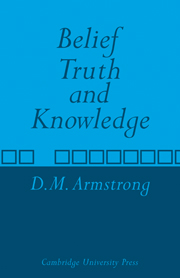Book contents
- Frontmatter
- Contents
- Part I Belief
- Part II Truth
- Part III Knowledge
- 10 Knowledge Entails True Belief
- 11 The Infinite Regress of Reasons
- 12 Non-Inferential Knowledge (1)
- 13 Non-Inferential Knowledge (2)
- 14 Inferential and General Knowledge
- 15 Further Considerations about Knowledge
- Conclusion
- Works referred to
- Index
15 - Further Considerations about Knowledge
from Part III - Knowledge
Published online by Cambridge University Press: 23 October 2009
- Frontmatter
- Contents
- Part I Belief
- Part II Truth
- Part III Knowledge
- 10 Knowledge Entails True Belief
- 11 The Infinite Regress of Reasons
- 12 Non-Inferential Knowledge (1)
- 13 Non-Inferential Knowledge (2)
- 14 Inferential and General Knowledge
- 15 Further Considerations about Knowledge
- Conclusion
- Works referred to
- Index
Summary
In this chapter various topics will be treated in a rather miscellaneous way, with the object of rounding out our account of the nature of knowledge. In the last section it will be argued that not only does the concept of knowledge presuppose the concept of belief, but that the concept of belief presupposes the concept of knowledge.
Knowledge of Knowledge
It is possible for A to know that p without knowing that he knows it (Kap & ∼ KaKap), and even for A to know that p and disbelieve that he knows it (Kap & Ba ∼ Kap). Nevertheless, when we know we very often know that we know and, indeed, one who says ‘I know that p’ implicitly commits himself to the claim that he knows that he knows that p. What conditions have to be satisfied for such knowledge of knowledge?
‘A knows that A knows that p’ (KaKap) is simply a substitutioninstance of ‘A knows that A1 knows that p’ (KaKa1p) for the special case where a1 = a. In what follows I give an account of the general case which can then be applied without the slightest difficulty to the special case. In the case where A knows that he himself knows something this knowledge of knowledge will often be non-inferential, a situation which seldom if ever occurs in the third person case. But we have given the same account of both inferential and non-inferential knowledge of particular states of affairs. There are two things to be noted about knowledge of knowledge.
Information
- Type
- Chapter
- Information
- Belief, Truth and Knowledge , pp. 212 - 219Publisher: Cambridge University PressPrint publication year: 1973
Accessibility standard: Unknown
Why this information is here
This section outlines the accessibility features of this content - including support for screen readers, full keyboard navigation and high-contrast display options. This may not be relevant for you.Accessibility Information
- 1
- Cited by
